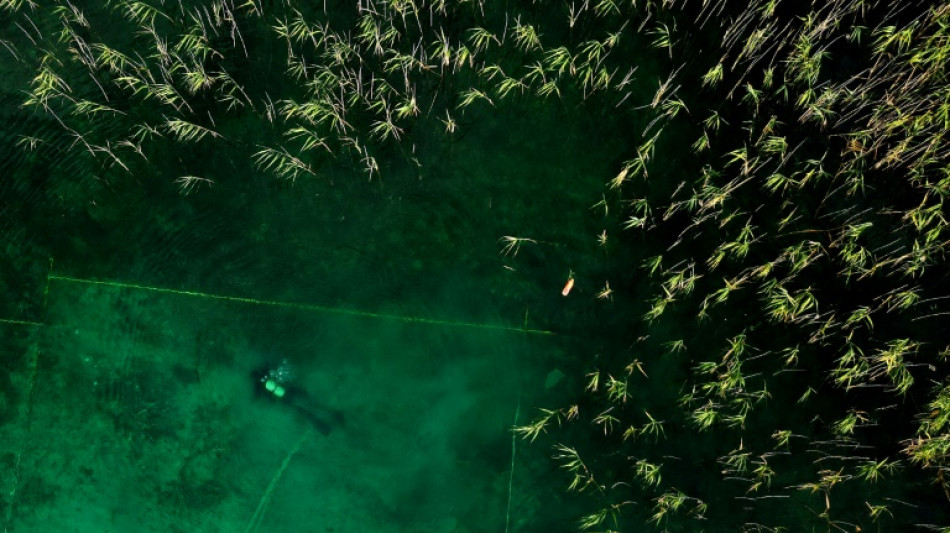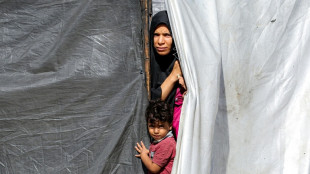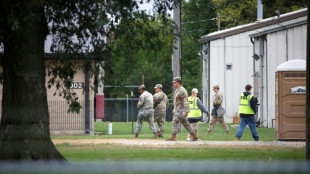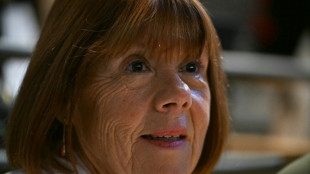
-
 Qatar, Turkey to join third day of Gaza peace talks in Egypt
Qatar, Turkey to join third day of Gaza peace talks in Egypt
-
Study finds women have higher genetic risk of depression

-
 Dolly Parton's sister calls for fan prayers over health issues
Dolly Parton's sister calls for fan prayers over health issues
-
On Trump's orders, 200 troops from Texas arrive in Illinois

-
 Two bodies found, two missing after Madrid building collapse
Two bodies found, two missing after Madrid building collapse
-
Panthers raise banner as NHL three-peat bid opens with win

-
 Nobel physics laureate says Trump cuts will 'cripple' US research
Nobel physics laureate says Trump cuts will 'cripple' US research
-
UFC star McGregor suspended 18 months over missed drug tests

-
 Trump talks up Canada trade deal chances with 'world-class' Carney
Trump talks up Canada trade deal chances with 'world-class' Carney
-
Ecuador president unharmed after apparent gun attack on motorcade

-
 Lyon exact revenge on Arsenal, Barca thrash Bayern in women's Champions League
Lyon exact revenge on Arsenal, Barca thrash Bayern in women's Champions League
-
Trump says 'real chance' to end Gaza war as Israel marks attacks anniversary

-
 Gerrard brands failed England generation 'egotistical losers'
Gerrard brands failed England generation 'egotistical losers'
-
NFL fines Cowboys owner Jones $250,000 over gesture to fans

-
 Bengals sign veteran quarterback Flacco after Burrow injury
Bengals sign veteran quarterback Flacco after Burrow injury
-
New prime minister inspires little hope in protest-hit Madagascar

-
 Is Trump planning something big against Venezuela's Maduro?
Is Trump planning something big against Venezuela's Maduro?
-
EU wants to crack down on 'conversion therapy'

-
 French sex offender Pelicot says man who abused ex-wife knew she was asleep
French sex offender Pelicot says man who abused ex-wife knew she was asleep
-
Trump says 'real chance' to end Gaza war as Israel marks Oct 7 anniversary

-
 UK prosecutors to appeal dropped 'terrorism' case against Kneecap rapper
UK prosecutors to appeal dropped 'terrorism' case against Kneecap rapper
-
Spain, Inter Miami star Alba retiring at end of season

-
 EU targets foreign steel to rescue struggling sector
EU targets foreign steel to rescue struggling sector
-
Trump talks up Canada deal chances with visiting PM

-
 Knight rides her luck as England survive Bangladesh scare
Knight rides her luck as England survive Bangladesh scare
-
Pro-Gaza protests flare in UK on anniversary of Hamas attack

-
 Top rugby unions warn players against joining rebel R360 competition
Top rugby unions warn players against joining rebel R360 competition
-
Outcast Willis 'not overthinking' England absence despite Top 14 clean sweep

-
 Trump says 'real chance' of Gaza peace deal
Trump says 'real chance' of Gaza peace deal
-
Macron urged to quit to end France political crisis

-
 No.1 Scheffler seeks three-peat at World Challenge
No.1 Scheffler seeks three-peat at World Challenge
-
Canadian PM visits Trump in bid to ease tariffs

-
 Stocks falter, gold shines as traders weigh political turmoil
Stocks falter, gold shines as traders weigh political turmoil
-
Senators accuse US attorney general of politicizing justice

-
 LeBron's 'decision of all decisions' a PR stunt
LeBron's 'decision of all decisions' a PR stunt
-
Observing quantum weirdness in our world: Nobel physics explained

-
 WTO hikes 2025 trade growth outlook but tariffs to bite in 2026
WTO hikes 2025 trade growth outlook but tariffs to bite in 2026
-
US Supreme Court hears challenge to 'conversion therapy' ban for minors

-
 Italy's Gattuso expresses Gaza heartache ahead of World Cup qualifier with Israel
Italy's Gattuso expresses Gaza heartache ahead of World Cup qualifier with Israel
-
EU targets foreign steel to shield struggling sector

-
 Djokovic vanquishes exhaustion to push through to Shanghai quarterfinals
Djokovic vanquishes exhaustion to push through to Shanghai quarterfinals
-
Stocks, gold rise as investors weigh AI boom, political turmoil

-
 Swiatek coasts through Wuhan debut while heat wilts players
Swiatek coasts through Wuhan debut while heat wilts players
-
Denmark's Rune calls for heat rule at Shanghai Masters

-
 Japanese football official sentenced for viewing child sexual abuse images
Japanese football official sentenced for viewing child sexual abuse images
-
'Veggie burgers' face grilling in EU parliament

-
 Trio wins physics Nobel for quantum mechanical tunnelling
Trio wins physics Nobel for quantum mechanical tunnelling
-
Two years after Hamas attack, Israelis mourn at Nova massacre site

-
 German factory orders drop in new blow to Merz
German factory orders drop in new blow to Merz
-
Man City star Stones considered retiring after injury woes


Archaeologists uncover Europe's oldest stilt village
Beneath the turquoise waters of Lake Ohrid, the "Pearl of the Balkans", scientists have uncovered what may be one of Europe's earliest sedentary communities, and are trying to solve the mystery of why it sheltered behind a fortress of defensive spikes.
A stretch of the Albanian shore of the lake once hosted a settlement of stilt houses some 8,000 years ago, archaeologists believe, making it the oldest lakeside village in Europe discovered to date.
Radiocarbon dating from the site puts it at between 6000 and 5800 BC.
"It is several hundred years older than previously known lake-dwelling sites in the Mediterranean and Alpine regions," said Albert Hafner, a professor of archaeology from Switzerland's University of Bern.
"To our knowledge, it is the oldest in Europe," he told AFP.
The most ancient other such villages were discovered in the Italian Alps and date to around 5000 BC, said the expert in European Neolithic lake dwellings.
Hafner and his team of Swiss and Albanian archaeologists have spent the past four years carrying out excavations at Lin on the Albanian side of Lake Ohrid, which straddles the mountainous border of North Macedonia and Albania.
The settlement is believed to have been home to between 200 and 500, with houses built on stilts above the lake's surface or in areas regularly flooded by rising waters.
- Fortress of spikes -
And it is slowly revealing some astonishing secrets.
During a recent dive, archaeologists uncovered evidence suggesting the settlement was fortified with thousands of spiked planks used as defensive barricades.
"To protect themselves in this way, they had to cut down a forest," said Hafner.
But why did the villagers need to build such extensive fortifications to defend themselves? Archaeologists are still searching for an answer to the elusive question.
Researchers estimate that roughly 100,000 spikes were driven into the bottom of the lake off Lin, with Hafner calling the discovery "a real treasure trove for research".
Lake Ohrid is one of the oldest lakes in the world and has been around for more than a million years.
Assisted by professional divers, archaeologists have been picking through the bottom of the lake often uncovering fossilised fragments of wood and prized pieces of oak.
- 'Like a Swiss watch' -
Analysis of the tree rings helps the team reconstruct the daily life of the area's inhabitants -- providing "valuable insights into the climatic and environmental conditions" from the period, said Albanian archaeologist Adrian Anastasi.
"Oak is like a Swiss watch, very precise, like a calendar," said Hafner.
"In order to understand the structure of this prehistoric site without damaging it, we are conducting very meticulous research, moving very slowly and very carefully," added Anastasi, who heads the team of Albanian researchers.
The lush vegetation at the site makes the work painstaking slow at times.
"Building their village on stilts was a complex task, very complicated, very difficult, and it's important to understand why these people made this choice," said Anastasi.
For the time being, scientists say it is possible to assume that the village relied on agriculture and domesticated livestock for food.
"We found various seeds, plants and the bones of wild and domesticated animals," said Ilir Gjepali, an Albanian archaeology professor working at the site.
But it will take another two decades for site to be fully explored and studied and for final conclusions to be drawn.
According to Anastasi, each excavation trip yields valuable information, enabling the team to piece together a picture of life along Lake Ohrid's shores thousands of years ago -- from the architecture of the dwellings to the structure of their community.
"These are key prehistoric sites that are of interest not only to the region but to the whole of southwest Europe," said Hafner.
A.Gasser--BTB


